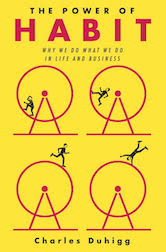I read The Power of Habit after reading Drive by Daniel Pink. It created

an interesting juxtaposition. Drive is a book that outlines how we are all individuals with deeply internalized reasons for doing what we do. The Power of Habit starts off outlining how we are ultimately automatons processing a series of subroutines. An idea that can be both off putting and depressing - until you realize that yes that may be the case but it is the individual that chooses (or rather should choose) which subroutine to process. As many Buddhists can attest to, this is not easy though it is often simple.
The book then takes a look at organizations as organisms with their own habits or routines ultimately deciding where they will end up. It covers off how to push change through an organization, usually capitalizing on tragedy or the perception of instability to make the organization pliant enough to embrace and internalize the change.
Then we end up through the looking glass - viewing how organizations use their understanding of habits to manipulate consumers into buying what they're selling. In both a realistic and Orwellian view of big business consumerism one is left wondering if this extreme invasion of privacy is something that should be outlawed or embraced. Sure it's creepy to have someone pawing through your digital refuse - but they're doing it to better customise your shopping experience. In a world where we are increasingly becoming isolated perhaps Target or Amazon will become our new best friends. Patiently listening to our wants and desires then helpfully offering up which soup we ought to be buying.
From there we briefly look at how habits made the Civil Rights movement of the 1960's possible then on to organized religion - where many of the same principals are used. In order to control a large group of people you need those people to internalize your message and act on it to the point of it becoming a habit. Without habits the group's organization and behaviour would unravel and cease as folks move on to what they're used to and what is familiar.
The book then talked about how habits can be so powerful they appear to remove free will. There have been court cases successfully argued that folks couldn't be held responsible for their behaviour as they were in the grips of a habit. Habits are stored and executed in a part of the brain that is separate from concious thought. Makes you wonder just how far fetched is the Bourne series after all.
Lastly Duhigg gives you a framework for identifying habits and changing them. All in all the book is exactly what it promises to be. It fulfills that promise in an interesting and entertaining way and only had me rolling my eyes in a few parts. Sure some of it is a bit depressing and little terrifying but mostly because that's the society we live in.
